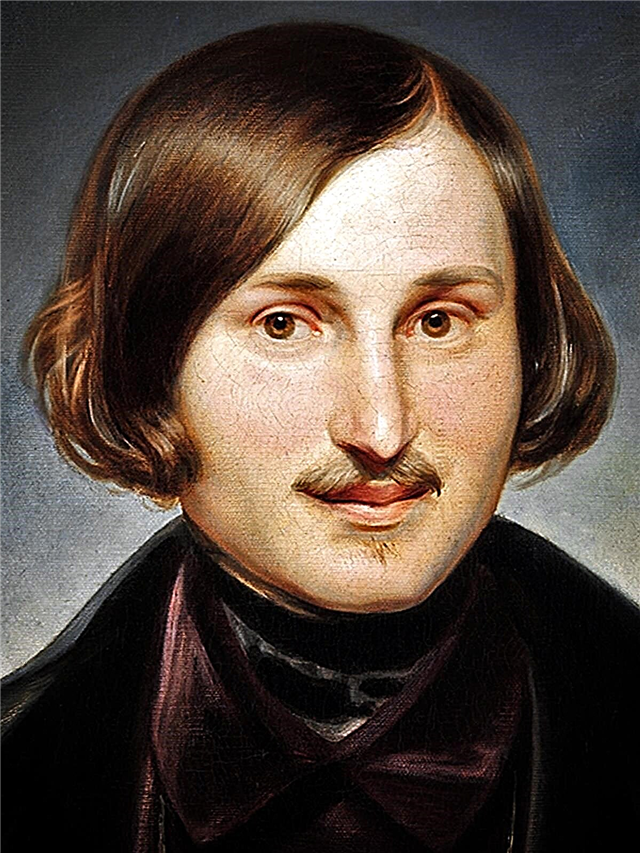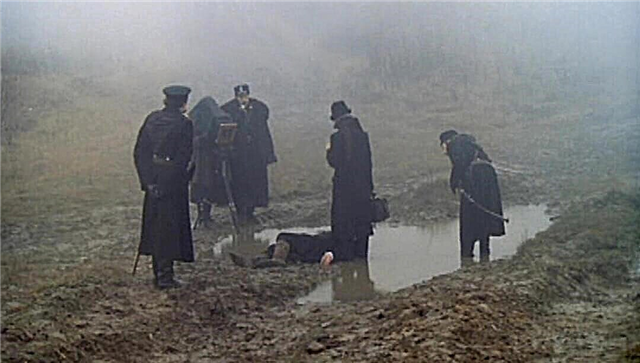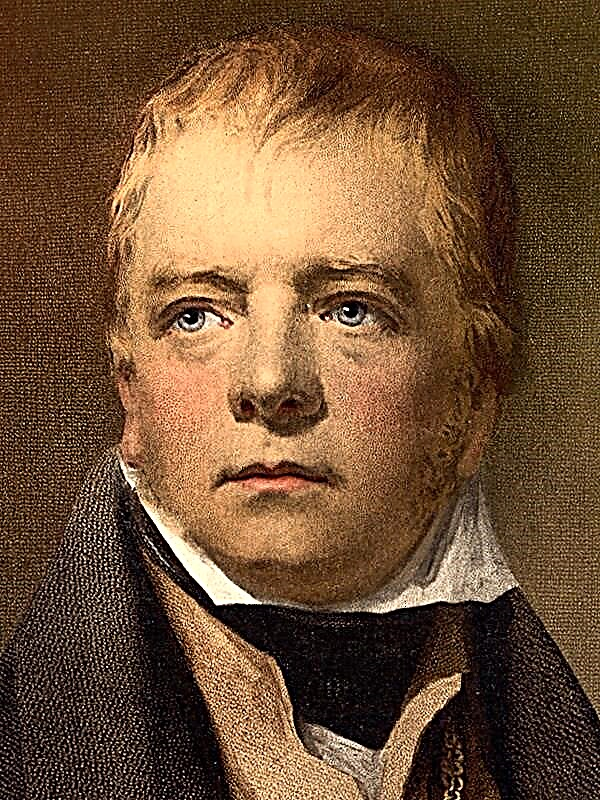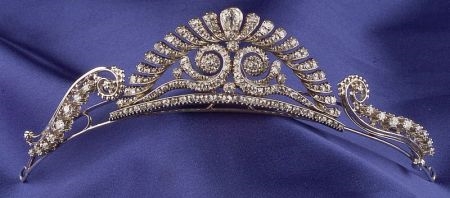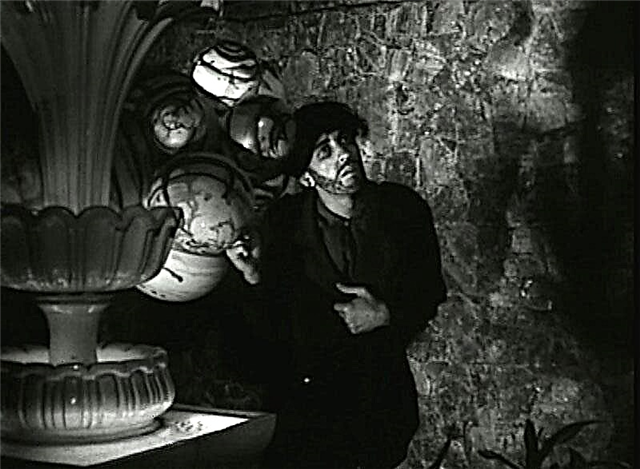Seventeen-year-old Melkur entered the light, "possessing everything that is required so as not to go unnoticed." He inherited a wonderful name from his father, a great fortune expected from his mother. The time was peaceful, and Melkur thought of nothing but pleasures. In the midst of fuss and brilliance, the young man suffered from a hearty emptiness and dreamed of exploring love, of which he had only the most vague idea. Naive and inexperienced, Melkur did not know how to make love ties in the upper circle. On the one hand, he had a rather high opinion of himself, on the other, he believed that only an outstanding person could have success in women, and did not hope to earn their favor. Melcourt began to think more and more about his mother’s friend Marquise de Lurce and convinced himself that he was in love with her. Once the marquise was known as a coquette and even anemone, but later acquired a strict and virtuous tone, so Melkur, who did not know about her past, considered her impregnable. The marquise easily guessed the feelings of Melkur and was ready to answer them, but the timid and respectful young man behaved so hesitantly that she could not do this without risking losing her dignity. Left alone with Melkur, she cast tenderly glances at him and advised him to keep more relaxed, but he did not understand the hints, and decency and fear of losing Melkur’s respect prevented the Marquise from taking the very first decisive step. So it took more than two months. Finally, the marquise was tired of waiting and decided to rush things. She began to seek out Melkur, with whom he was in love, but the young man, not hoping for reciprocity, did not want to reveal his secret. The Marquise stubbornly sought recognition, and in the end Melkur made love to her. The marquise was afraid that too easy a victory would cool the ardor of the young man, but he was afraid by his harassment to offend her. So they, both desiring the same thing, could not come to their cherished goal. Annoyed at the severity of the marquise, Melkur went to the theater, where he saw a girl who impressed him with her beauty. The Marquis de Germail, a young man of a good appearance, who was universally respected, entered the box of a beautiful stranger, and Melcourt felt jealous. After that, for two days he searched everywhere for a stranger, went around all the theaters and gardens, but in vain - he never met either her or Germail.
Although Melcourt had not seen the Marquis de Lyurs for three days, he did not miss her very much. At first, he reflected on how he could win one and at the same time not lose another, but since the indestructible virtue of the marquise made all further attempts hopeless, he decided, with common thought, to give his heart to the one he liked more. The Marquise, seeing that the unlucky admirer does not show her nose and does not renew attempts to win her heart, was alarmed. She went on a visit to Madame de Melcourt and, seizing the moment, demanded an explanation from the young man. The marquise reproached him for avoiding her and rejecting her friendship. Melkur tried to make excuses. Fascinated by the circumstances, he began to reassure the Marquise of his love again and asked for permission to hope that her heart would someday soften. The Marquise, no longer relying on Melcourt's ingenuity, more and more clearly showed her her disposition. The young man should have asked for a date, but shyness and uncertainty interfered with him. Then the marquise came to his aid and said that she would be home tomorrow afternoon and could accept him. The next morning, Melkur went to Germail in the hope of learning something about the stranger, but Germail had left the city for several days. Melkur went to the Tuileries Garden, where he accidentally met two ladies, one of whom was a long-standing beautiful stranger. Melkur managed to eavesdrop on the conversation of the ladies, from which he found out that his beloved liked the stranger in the theater a young man. Melkur did not believe that it could be himself, and was tormented by jealousy for a stranger.
In the evening, Melcourt went to Madame de Lurse, who waited in vain for him all day. When Melkur saw the marquise, dying feelings flashed in his soul with renewed vigor. The Marquise felt her victory. Melkur wanted to hear a declaration of love from her, but there were guests in the house, and he could not talk to her in private. He imagined that he had conquered a heart, hitherto not knowing love, and was very proud of himself. Later, reflecting on this first of his experiences, Melkur came to the conclusion that it is more important for a woman to flatter a man’s vanity than to touch his heart. The marquise's guests left, and Melkur lingered, allegedly waiting for a late coach. Left alone with the marquise, he felt a fit of fear that he had not experienced in his entire life. Indescribable excitement swept over him, his voice trembled, his hands did not obey. The marquise confessed his love to him, but in return he fell at her feet and began to assure her of his passionate feelings. He did not understand that she was ready to surrender to him, and was afraid of excessive liberty to push her away from herself. The annoyed marquise had no choice but to ask him to leave. When Melkur came to his senses and recovered from embarrassment, he realized the absurdity of his behavior, but it was too late. He decided at the next date to be more persistent. The next day, Count de Versailles came to visit Melkur’s mother. Madame de Melcourt did not like the count and considered his influence harmful to her son. Melkur admired Versac and considered him a role model. Versacus was a daring racket, he deceived and ridiculed women, but his charming impudence did not avert them, but, on the contrary, captivated them. He won many victories and acquired many imitators, but, not possessing the charm of Versac, they copied only his shortcomings, adding them to their own. Versak right from the doorway began to caustically slander about a variety of people. He did not spare the Marquis de Lurse, telling Melcourt some details of her past life. Melkur felt cheated. The immaculate goddess was no better than other women. He went to the Marquise “with the intention of repaying her with the most insulting signs of contempt for the ridiculous notion of her virtue,” which she managed to instill in him. To his great surprise, he saw Versac's carriage in the marquise's courtyard. Versacus and the Marquise spoke as best friends, but after his departure, the Marquise called him the most dangerous veil, the most nasty gossip and the most dangerous villain at court. Melkur, who did not believe a single word of the marquise, behaved so cheekily and began to harass her so rudely that she was offended. While they sorted out the relationship, the footman reported the arrival of Madame and Mademoiselle de Tevil. Melcourt heard this name: Madame de Tevil was a relative of his mother, but lived in the province, so he never saw her. What a surprise the young man was when he recognized his beautiful stranger in Mademoiselle de Teuville! It seemed to Melkur that Hortensia - that was the name of the girl - reacted to him with indifference and even with neglect. This thought afflicted him, but did not cure love. When the footman reported on the arrival of another guest, Madame de Cénange, Melcourt paid almost no attention to her, but Madame de Cénange was very interested in the young man coming into the light. This was one of those philosopher-minded ladies who believe that they are above prejudice, while in fact they are below all morality. She was not young, but retained the remains of former beauty. She immediately took it into her head that she should take up the education of Melkur and “form” him - this fashionable expression contained a lot of concepts that could not be precisely defined. Melkur was embarrassed by her cheeky manners and considered her an old coquette.
Versac appeared in the evening, accompanied by the Marquis de Pranzi, whose presence clearly confused the Marquise de Lurce - apparently, Pranzi was once her lover. Versacus drew attention to Hortense and struggled to please her, but the girl remained cold. Versacus did everything to set up those present against each other. He whispered to the marquise that Madame de Cénange wanted to take possession of Melcourt's heart, and the marquise was tormented by jealousy. At dinner, guests ran out of new gossip. When they got up from the table, the marquise offered to play cards. Melkur promised to send Mrs. de Senange the satirical couplets that she liked, but Versac said it would be more polite not to send, but to bring them, and there was nothing left for Melkur to promise Mrs. Senange to deliver them in person. Versacus was clearly glad that he had managed to annoy the marquise. Madame de Lurce requested Melcourt to pick her up tomorrow afternoon to go together with Madame de Tevil. Melkur enthusiastically agreed, thinking only of Hydrangea. Arriving the next day at the Marquise, Melcourt, completely disappointed in her after learning of her former weakness for Herr de Pranzi, behaved with her so indifferently that the Marquise suspected him of Madame de Cenange's serious infatuation. The Marquise de Lurce condemned his choice and tried to reason with him. Melkur only thought about how he would often see Hortense. Arriving at Madame de Tevil, Melcourt spoke to the girl and was ready to believe in her disposition to him, but then the Marquis de Germail arrived, and it seemed to Melcourt that Hortense was in love with the Marquise. Melkura was gripped by such anguish that he turned pale and changed in his face. The Marquise attributed the sad face of Melcourt to thoughts of Madame de Cénange and the incessant talk about her caused the young man to be annoyed. Dry saying goodbye to the Marquise, Melcourt left Madame de Tevil and went to Madame de Senange. It was already quite late, and he did not expect to find her at home, which would give him the opportunity to leave the couplets and leave, but Madame de Cenange was at home and was very happy about him. In punishment for the late visit, she ordered him to accompany her and her friend Madame de Montgene to the Tuileries. Melcourt was dissuaded, but Madame de Cenange was so insistent that he had to give in. Madame de Montgen was young, but seemed so old and withered that it was a pity to watch. Both ladies vied with each other trying to capture Melkur's attention and, feeling like rivals, showered each other with barbs. In Tuileries, all eyes were on Melkur and his companions. Madame de Cénange at all costs wanted to prove to everyone that Melcourt belonged to her, and not to Madame de Montgen. On top of all the troubles on the bend of the alley, Melcourt saw the Marquise de Lurce, Madame de Tevil and Hortense, walking towards them. It was unpleasant for him that the girl saw him in the company of Madame de Cenange. The marquise, well-controlled, answered Melkur's awkward bow with a sweet and laid-back smile.
After the departure of Madame de Cénange, Melcourt tracked down Madame de Lurce and her companions. The marquise began to taunt Melcourt and describe the quirks and vices of Madame de Senange. Melkur was furious, he began to defend Madame de Cenange and extol her dignity, forgetting that not only the Marquise, but also Hortense was listening to him. After convincing both of them in his love for Madame de Senange, Melkur fell into despondency, for he realized that he himself had closed his way to the girl’s heart. Returning home, he indulged in gloomy and fruitless thoughts all night. The next morning they brought him a letter from Madame de Lurce. She notified him that she was leaving for two days in the village and invited her to be accompanied. Melkur, who firmly decided to break up with her, refused: he wrote that he had already bound himself with a promise that he could not break. But it turned out that the marquise was going to the village with Hortense and her mother, so Melkur regretted his refusal. During their absence, he could not find a place and was very happy when Versak came to him. Seeing the melancholy mood of Melcourt, Versac attributed it to separation from Madame de Cenange, who had left for Versailles for two days. Versac decided to enlighten Melkur and show him the light as it should be seen. He opened his eyes to the youth on the falsehood and emptiness of secular society and explained that a crime against honor and reason is considered more excusable than violation of secular decency, and a lack of mind is more excusable than its excess. Versac believed that one should not be afraid to overestimate oneself and underestimate others. It is in vain to believe that only a person with special talents can shine in the light. “Look at how I behave when I want to show off: how I behave, how I draw, what nonsense I carry!” - said Versak. Melkur asked him what a good tone is. Versak found it difficult to give a clear definition, for this expression was on everyone’s lips, but no one really understood what it meant. According to Versak, a good tone is nothing but a noble birth and ease in secular tomfoolery. Versak taught Melkur: "As a woman is ashamed to be virtuous, so it is indecent for a man to be a scientist." The greatest achievement of good form is a small talk, completely devoid of thoughts. In conclusion, Versac advised Melcourt to pay attention to Madame de Cenange, considering her the most suitable for an inexperienced young man. After parting with him, the young man lost in thought about Hortense. Having hardly waited for her return from the village, he hastened to her and found out that she and Madame de Tevil were in Paris, but had gone away somewhere. His impatience was so great that he rushed to the Marquis de Lurse, deciding that Hortense was probably with her. The marquise had many guests, but Hortense was not among them.
The Marquise met Melkur without a trace of embarrassment and annoyance and spoke to him as if nothing had happened. Her calm benevolence infuriated Melkur, the idea that the Marquise had fallen out of love with him hurt his pride. He noticed that Madame de Lurce often looked at the Marquis de ***, and decided that she had already found a replacement for him in the Marquise. Melkur remained after the departure of the guests and asked the Marquis to give him an hour or two. The young man expressed all his grievances to her, but she behaved so cleverly that he himself felt how ridiculous he was. The marquise said that she sincerely loved Melkur and forgave him the shortcomings of inexperienced youth, believing that he possessed the purity and sincerity inherent in youth, but was mistaken in him and now was severely punished, Melkur felt a surge of love and tenderness for the marquise. The Marquise invited him to enjoy friendship, but Melkur did not want to stop halfway. His former respect for the Marquis was resurrected, and the victory over her virtue seemed incredibly difficult and honorable.
Self-deception lasted a long time, and Melkur did not think of infidelity. But one fine day he felt a spiritual emptiness and returned to thoughts of Hortense. He promised nothing to Hortense, and she did not love him, and yet he felt guilty before her. At the same time, he could not leave the marquise. "Reproaches of conscience spoiled my pleasure, pleasures drowned my repentance - I no longer belonged to myself." Overwhelmed by conflicting feelings, he continued to visit the marquise and dream of Hortense.

